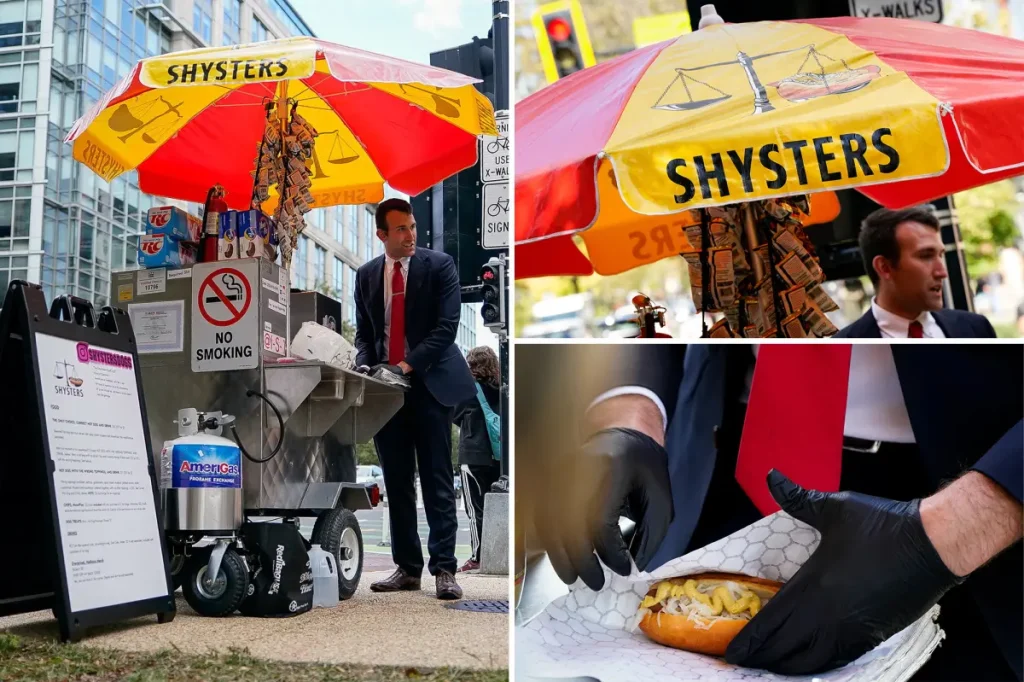From IRS Attorney to Hot Dog Vendor: A Dream Job During Government Shutdown
In the heart of Washington DC, amid the backdrop of a government shutdown, an unexpected entrepreneur has emerged, bringing a touch of whimsy and nostalgia to the capital’s streets. Isaac Stein, a furloughed IRS lawyer, has traded his suit and briefcase for a different kind of suit and a hot dog cart. While many federal employees are anxiously awaiting the resolution of the budget impasse that began on October 1st, Stein is embracing this unplanned hiatus as an opportunity to fulfill a childhood dream that has simmered on the back burner of his ambitions for decades.
“Shysters” – with its tongue-in-cheek slogan “The Only Honest Ripoff in DC” – isn’t just a means of generating income during uncertain times; it represents the culmination of a passion that began when Stein was just 12 years old. While other boys his age were engrossed in basketball games, young Isaac found himself captivated by the concession stand operations. “All the other boys were interested in the game,” he recounted to Reuters with a smile. “I had way more interest selling chips and soda.” This early fascination with food service and customer interaction planted the seed for what would eventually become his current venture, albeit under unexpected circumstances. What makes Stein’s story particularly remarkable is his willingness to invest significantly in this dream, having spent a five-figure sum to secure his cart and supplies for what was initially intended to be merely a “fun weekend project.”
The menu at Shysters embodies simplicity and tradition. Stein offers what he calls “The Only Choice: Correct Hot Dog and Drink” – a straightforward but meticulously crafted combination of a steamed frank topped with spicy brown mustard and sauerkraut. For those with more adventurous palates, he also provides Chicago-style giardiniera as a topping option. The nostalgic feel extends to his beverage and dessert offerings: RC Cola and Moon Pies, a combination once fondly known as “the working man’s lunch” in American culture. Adding a playful educational element to his business, Stein offers a five-cent discount to any customer who can recite the historical significance of this classic pairing – a small but meaningful gesture that creates moments of connection and shared knowledge between vendor and patron.
These connections lie at the heart of what Stein finds most rewarding about his temporary career change. While his legal work at the IRS provides intellectual challenges and professional satisfaction, he admits that much of it is solitary in nature. In contrast, operating the hot dog cart offers him continuous human interaction throughout the day. “There’s a connection with people. There’s the small talk of asking people about their day. It’s like reading vignettes in a novel. You feel really connected,” Stein explains, highlighting how these brief exchanges with customers from all walks of life create a tapestry of human stories that enrich his daily experience. This aspect of community engagement has transformed what could have been a stressful period of employment uncertainty into something unexpectedly fulfilling and joyful.
The image of Stein serving hot dogs while still dressed in his professional attire – a suit that would typically be seen in government offices or courtrooms – creates a visual representation of his dual identity during this transitional period. This sartorial choice might be practical (perhaps he was already dressed for work when the shutdown announcement came), symbolic of his temporary status between two worlds, or simply a humorous juxtaposition that catches the eye of potential customers. Whatever the reason, it serves as a perfect visual metaphor for the adaptability and resilience that many federal workers are demonstrating during this challenging time. Stein has managed to transform furlough – a word that usually evokes anxiety and financial stress – into an opportunity for personal fulfillment and community building.
As the government shutdown continues with uncertain resolution, Stein’s story offers a refreshing perspective on making the best of difficult circumstances. While many await with frustration the political processes that will eventually return them to their regular employment, Stein has found a way to create meaning, joy, and even a modest income during this unplanned career intermission. His hot dog cart stands as a small but significant reminder of the entrepreneurial spirit and personal resilience that can emerge during challenging times. When the shutdown eventually ends and Stein returns to his desk at the IRS, he will carry with him not just memories of his temporary venture into food service but also the countless connections made with fellow citizens over the humble hot dog – proving that sometimes our most cherished dreams don’t require abandoning our chosen careers but can instead complement them in unexpected ways during life’s unplanned detours.


